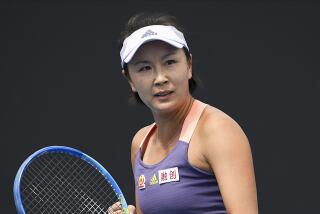Death sentence for businesswoman arouses opposition in China
- Share via
Reporting from Beijing — A few years ago, she embodied the rags-to-riches legend of modern China: The daughter of an illiterate farmer starts a hair salon when she is just 15, and in little more than a decade creates a business empire that makes her one of the country’s wealthiest women.
Now the country’s “sister millionaire,” still only 31 and looking much like a schoolgirl with her ponytail and straight-cut bangs, has come to symbolize something far different: opposition to the death penalty.
A provincial court on Jan. 18 upheld Wu Ying’s death sentence on charges of fraud and “illegal fund-raising,” violating legislation aimed at fighting underground banking and loan-sharking. Since then, her cause has won the backing of members of China’s business community, which normally steers clear of politically sensitive human rights issues.
Among her supporters is the editor of the Global Times, a newspaper closely tied to the Communist Party. An online poll found people opposing the death penalty for Wu by a margin of 10 to 1. Those who put themselves on record against it included real estate tycoon Pan Shiyi and technology executive Kai-Fu Lee, the former head of Google’s China operation.
Lawyers, human rights activists and scholars opposed to imposing the death sentence on Wu gathered this month for a seminar in Beijing. “This case is really about the lack of independence of the Chinese judicial system,” said one participant, Hu Xingdou, an economist with the Beijing Institute of Technology. “Somebody clearly wanted to send Wu Ying to her death.”
Supporters say she didn’t do anything different from many other entrepreneurs, who have to work around a banking system that still favors state-run enterprises, and that her case has had a chilling effect on business. Others say that even if what she did was illegal, she shouldn’t be put to death.
Ambitious young people like Wu grew up believing that they would serve the country by creating businesses and providing jobs, said her father, Wu Yongzheng. “Why is there so much government propaganda about entrepreneurship if people like my daughter get punished?” he said in a telephone interview.
John Kamm, executive director of the San Francisco-based Dui Hua Foundation, a human rights organization, said Wu Ying’s was a “wedge case.”
“Even for people who support the death penalty, there is a strong feeling that you shouldn’t kill people for economic crimes,” he said. “That is simply barbaric.”
China revised its criminal code last year to remove 13 nonviolent crimes from the list of those punishable by death. The Dui Hua Foundation says the number of executions has been cut by about half since 2007, when the Supreme Court began reviewing death sentences imposed by local and provincial courts.
But still, about 4,000 people are executed each year, the highest number in the world, Dui Hua says.
The Supreme Court has announced its intention to review Wu’s sentence, and issued a rare public statement Tuesday promising to “strictly abide by the truth.”
The oldest of four daughters of a rice farmer, Wu dropped out of a vocational high school in the coastal province of Zhejiang, south of Shanghai, to work in an aunt’s hair salon. Then she started her own. A string of other businesses followed: a car rental agency, a karaoke club, a foot massage parlor and a cosmetic company that made face creams from sheep placenta.
Her company, Bense Holding Group, announced plans to expand into petrochemicals and construction.
By the time she was 26, she was ranked as the sixth-wealthiest woman in China, with assets estimated at more than $500 million. Nicknamed the “sister millionaire,” she appeared in magazine profiles, always wearing either all black or all white. Her company owned Ferrraris and BMWs.
Her downfall was just as sudden. In late 2006, one of her creditors kidnapped her for eight days, a practice not uncommon in Zhejiang’s underground lending business. She acknowledged afterward that she was experiencing a “cash flow” problem. In February 2007, local authorities arrested her and confiscated property, including apartments, 41 cars and a stash of jade.
In 2009, she was convicted and sentenced to death for illegally raising millions of dollars from investors for businesses, including hotels, construction, real estate and foreign trade, that never came to fruition.
The presiding judge in the case, Shen Xiaoming, said last week in an interview with the Legal Daily that Wu had been borrowing money to fund a lavish lifestyle.
“She fabricated stories that she would use the money to invest in commercial properties, coal and the petroleum business,” Shen said. “She gave the public the wrong impression that she had solid financial backing by registering lots of fake companies within a short period of time and buying advertisement space along roads to promote her company.”
Her backers say small entrepreneurs often have to resort to private lending, frequently from investors seeking higher interest rates, because the formal banking system still favors the state-run economy.
“Business people are scared because this is such a common practice in China,” said Teng Biao, a Beijing lawyer and activist who has represented several clients fighting the death penalty.
Wu’s supporters say she could have paid back the money if her businesses hadn’t been shut down so abruptly. Some of her creditors testified on her behalf during the trial.
Since her conviction, the underground banking system in Zhejiang, estimated at $600 million a year, has struggled. Defaults are rampant and many deeply indebted entrepreneurs have fled the country, leaving creditors and their employees in the lurch.
“There are so many of these businessmen who borrowed much more money than Wu Ying, and then ran away. Wu Ying didn’t do that. She didn’t run. She tried to pay her debts,” said Zhang Yanfeng, one of her lawyers.
He described her as “very innocent, almost childlike.”
In a letter to her family after she was arrested, Wu expressed regret for what had happened: “If I had a chance to do my life all over again, I would choose to be an ordinary person living an ordinary life.”
John Lee and Tommy Yang in The Times’ Beijing bureau contributed to this report
More to Read
Sign up for Essential California
The most important California stories and recommendations in your inbox every morning.
You may occasionally receive promotional content from the Los Angeles Times.










